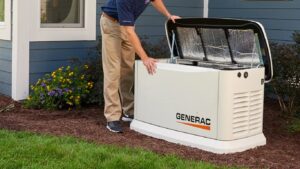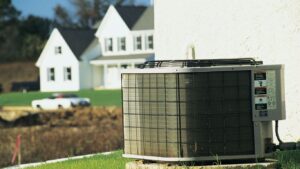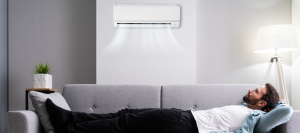
If your furnace starts blowing cold air, it could be a minor issue or a sign of a bigger problem. This often occurs when furnaces are turned on in the fall after being off since spring. Even with routine maintenance, issues can arise after months of inactivity. The problem could be evident at the start of the cold season or appear suddenly after months of operation. Our experience in troubleshooting these issues reveals both simple and complex solutions. Let’s explore the potential causes and fixes for your furnace’s cold air issue.

When you turn your furnace on, it first heats the flames and then there’s a slight delay before the blower activates. Since the ducts are initially filled with cold air from inactivity, the furnace needs to expel this cold air before the warmth is felt.
A brief cool air is normal.
However, if it doesn’t warm up soon after, there could be underlying issues at play.
If your thermostat is still set to “Cool” from the warmer months, switching it to “Heat” might fix the issue. You could also check if it’s set to “Fan,” as this mode activates only the blower, not the heating function. Setting it to “Auto” may turn the system on.
Also, if the temperature is set low (around 68) for air conditioning, try increasing it to around 72 degrees. However, if the thermostat wires are shorted and have lost connection with the furnace, causing continuous running without heat, you’ll need to contact an HVAC professional.
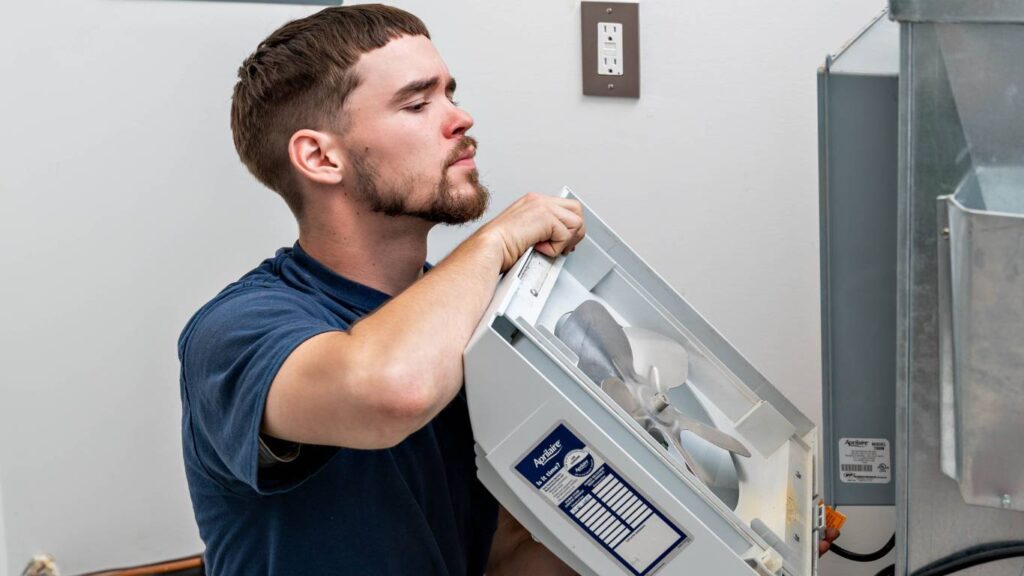
Air filters in your heating system play a vital role in maintaining indoor air quality and making sure your furnace runs smoothly. Over time, these filters can become clogged with dust, dirt, and other airborne particles, causing it to choke out and limit the proper airflow to the furnace. This restriction can cause your furnace to work much harder than it needs to, potentially leading the unit to overheat. When the heat exchanger in your furnace overheats, it can trigger the furnace’s safety mechanisms, such as the limit switch, which shuts off the burners to prevent further damage. This may cause cold air to blow out from your furnace.
Regularly checking and replacing your air filters can help prevent this issue from happening. Depending on the filter type, some may require you to change them every few months, while others may last up to a year. Some air filters can be washed and reused.
Airflow issues may not just stem from a clogged furnace filter. They can also happen if you have furniture or other items blocking the return air registers, making it difficult for air to flow properly to furnace. This has a similar effect as a dirty filter, where the furnace struggles to pull in enough air, causing weak airflow even if the air is heat. It’s important to keep the return vents clear for optimal furnace performance.
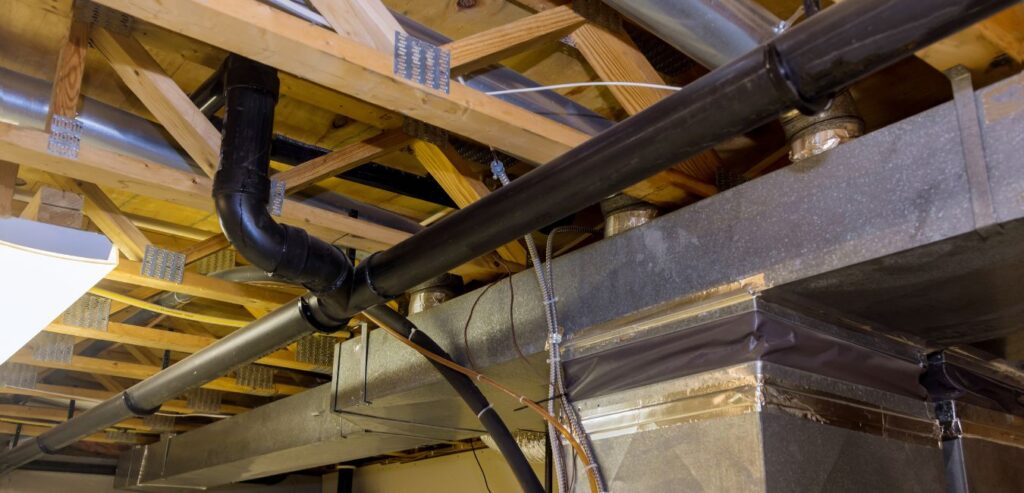
Energy Star reports that 20 to 30 percent of air in ductwork systems is lost due to leaks and ducts poorly connected together. This can cause cold air from unheated spaces entering your ductwork, reducing the heating efficiency throughout your home.
The leaks in your home’s ductwork will cause cold air from other rooms to seep into the vents, and the hot air may end up in the basement before it reaches the furthest areas of your house.
Dampers in ductwork control airflow to different areas of your home. They can be adjusted manually or controlled by a smart thermostat. They’re useful for creating zones, especially in winter, to direct heat where needed. If a room is too cold, adjusting the dampers can redirect airflow to balance the temperature.
Making adjustments to your dampers seasonally is common, so if you’re experiencing cold spots, it might be time to reposition the dampers for the winter season. Adjusting them can be a bit of trial and error, but it’s a practical step for even heating throughout your home.
For modern furnaces without pilot lights, flame sensors are important in carrying out the heating cycle. If these sensors get dirty, it may cause your furnace to blow cold air. In this case, we recommend cleaning the sensor.
An igniter detects whether a flame is present or not. Depending on the furnace type, it may cause the furnace to go into full cycle, and continuously run the blower, even without a flame.
In older furnaces with pilot lights, issues can happen if debris clogs the pilot light shaft. If you see it struggle to light or there’s a yellow flame instead of blue. This may be a sign of blockage, and will limit the amount of heat the furnace can produce.
If the gas line is damaged, not only will your furnace stop working, but so will other appliances like your stove and water heater. A furnace automatically shuts down if it doesn’t receive enough gas for heating. In such cases, it’s very important to contact your local gas company immediately!
If you’re in Downriver or the surrounding Metro Detroit area and your furnace is blowing cold air, try starting with a simple reset: turn it off, wait a minute, and turn it back on. This can often start the heating cycle. If this doesn’t solve the issue, it’s time to call in the experts at Flo-Aire Heating, Cooling & Electrical. Simply book an appointment with one of our HVAC technicians to assist you with your furnace troubles!
The frequency of changing furnace filters depends on the type of filter used, the usage of the heating system, and environmental factors such as dust, pet hair, or pollen. Generally, it's recommended to change furnace filters every 3-6 months, but homes with higher levels of dust or pet dander, or residents with allergies, might require more frequent changes. Regularly changing filters not only ensures better air quality but also maintains the efficiency and longevity of your furnace.
A furnace making unusual noises can indicate a variety of problems. Banging sounds may suggest issues like delayed ignition or loose components within the system. Whistling could be a sign of restricted airflow, possibly due to a clogged filter or blocked vents. Humming noises often point to electrical issues or a failing blower motor. Addressing these sounds promptly is important to prevent further damage and maintain the longevity of your furnace.
If a heat pump is blowing cold air, it could be undergoing a normal defrost cycle, especially in colder weather. However, persistent cold air might indicate more serious issues like malfunctioning outdoor units, which are responsible for the heat exchange process. Problems could include fan or motor malfunctions or low refrigerant levels. Ensuring your heat pump receives regular maintenance and professional check-ups can help to diagnose these problems early and keep your system running efficiently.
When an electric furnace blows cold air, it usually indicates a problem in the heating system. Common issues include electrical faults like tripped circuit breakers, which prevent the furnace from receiving power, or issues with heating elements failing to generate heat. Thermostat malfunctions are also a possibility, where incorrect settings or mechanical failures could prevent the system from heating. Regular maintenance is key to identifying and fixing these issues before they lead to a complete system failure.
Blocked condensate lines in your heating system can lead to significant issues. When these lines are clogged, they prevent water produced during the heating process from draining away, which can lead to water overflow and potential damage to your system and property. Regularly clearing these lines of any blockages, such as algae or mold build-up, is essential to maintain the efficiency and safety of your heating system.
Locally owned and operated in Southgate, MI since 1955, Flo-Aire Heating, Cooling & Electrical is one of the top heating & cooling companies in Southeast Michigan. Flo-Aire provides residential, commercial and industrial HVAC services throughout all of Metro Detroit.

